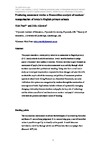Producing assessment truths: a Foucauldian analysis of teachers’ reorganisation of levels in English primary schools
| dc.contributor.author | Pratt, Nicholas | |
| dc.contributor.author | Alderton, J | |
| dc.date.accessioned | 2019-03-01T08:31:32Z | |
| dc.date.issued | 2019-01-29 | |
| dc.identifier.issn | 0142-5692 | |
| dc.identifier.issn | 1465-3346 | |
| dc.identifier.uri | http://hdl.handle.net/10026.1/13379 | |
| dc.description.abstract |
This article considers a recent policy initiative in assessment in English primary schools (ages 5-11 years) in which curriculum levels used by teachers to judge pupils attainment were suddenly removed. Previous work has largely focused on assessment of pupils, but we examine assessment as an activity through which teachers reproduce their professional standing. Using data from a small-scale study we investigate how teachers responded to these changes and what this tells us about the way in which the economy, and politics, of assessment practices operate at school level. Using Foucault as a theoretical framework, we make visible how this system was reorganised by teachers through the construction of new regimes of truth. Implications include evidence of a potentially damaging changing relationship between teachers and pupils, the key role of technology and the deleterious effect of neoliberalism on teachers and pupils relationships with both the process and subject matter of learning. | |
| dc.format.extent | 581-597 | |
| dc.language | en | |
| dc.language.iso | en | |
| dc.publisher | Taylor & Francis (Routledge) | |
| dc.subject | Assessment | |
| dc.subject | Foucault | |
| dc.subject | governmentality | |
| dc.subject | power | |
| dc.subject | teacher accountability | |
| dc.subject | truth | |
| dc.title | Producing assessment truths: a Foucauldian analysis of teachers’ reorganisation of levels in English primary schools | |
| dc.type | journal-article | |
| dc.type | JOUR | |
| plymouth.author-url | https://doi.org/10.1080/01425692.2018.1561245 | |
| plymouth.issue | 5 | |
| plymouth.volume | 40 | |
| plymouth.publication-status | Published | |
| plymouth.journal | British Journal of Sociology of Education | |
| dc.identifier.doi | 10.1080/01425692.2018.1561245 | |
| plymouth.organisational-group | /Plymouth | |
| plymouth.organisational-group | /Plymouth/Faculty of Arts, Humanities and Business | |
| plymouth.organisational-group | /Plymouth/Faculty of Arts, Humanities and Business/Plymouth Institute of Education | |
| plymouth.organisational-group | /Plymouth/REF 2021 Researchers by UoA | |
| plymouth.organisational-group | /Plymouth/REF 2021 Researchers by UoA/UoA23 Education | |
| plymouth.organisational-group | /Plymouth/Research Groups | |
| plymouth.organisational-group | /Plymouth/Research Groups/Institute of Health and Community | |
| plymouth.organisational-group | /Plymouth/Users by role | |
| plymouth.organisational-group | /Plymouth/Users by role/Academics | |
| dcterms.dateAccepted | 2018-12-17 | |
| dc.rights.embargodate | 2020-7-28 | |
| dc.identifier.eissn | 1465-3346 | |
| dc.rights.embargoperiod | Not known | |
| rioxxterms.versionofrecord | 10.1080/01425692.2018.1561245 | |
| rioxxterms.licenseref.uri | http://www.rioxx.net/licenses/all-rights-reserved | |
| rioxxterms.licenseref.startdate | 2019-01-29 | |
| rioxxterms.type | Journal Article/Review |


